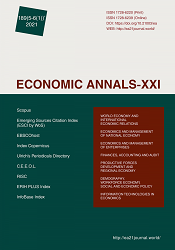External labour migration as an object of public administration
External labour migration as an object of public administration
Author(s): Yerzhan S. Syzdykbekov, Baldyrgan K. Jazykbayeva, Botagoz T. Matayeva, Saule A. RakhimovaSubject(s): Public Administration, Labor relations, Migration Studies, Human Resources in Economy
Published by: Institute of Society Transformation
Keywords: Migration; Public Administration; Economics; Labour; Kazakhstan; Transformation; Population; Regulation;
Summary/Abstract: External labour migration reflects the consequences of the implemented public policy reforms. Kazakhstan, as a country with a vulnerable and extremely unstable economy, demonstrates the high sensitivity of the population to the complication of economic conditions due to public sector reforms. For a long time, the number of emigrants remains high and poses a threat to the country’s labour market. Due to the crisis phenomena in Kazakhstan, work migration processes are intensifying. They are an inevitable consequence of the deterioration of living standards and the difficulty of people’s ability to self-sufficiency in the context of an economic downturn while playing a balancing role and potentially beneficial for each country. However, it is very difficult to assess the real scale of Kazakh migration processes and their impact on the state of the national labour market. The study of migration processes in the context of globalization occupies an important place in the works of both scientists and practitioners in all countries of the world, and is also the subject of the activities of the International Organization for Migration (IOM), the International Labour Organization (ILO), the International Committee on Migration, and the World Health Organization. The aim of this study is to analyze the current situation of immigration from Kazakhstan and its impact on the economic processes in the state from the point of view of public administration. The close relationship between migration and economic development is confirmed in our study by significant historical experience. It is still indisputable today. However, at the present stage, the nature of this relationship is much more complex and multidimensional and quite often is not unambiguous. The versatility of modern migration processes in the context of global development makes it necessary to develop new conceptual approaches to the study of the problem of labour migration, which will allow the evolution of migration policy, neutralize the negative consequences and unlock the development potential inherent in labour migration.
Journal: Економічний часопис - ХХІ
- Issue Year: 189/2021
- Issue No: 05+06 (2)
- Page Range: 69-78
- Page Count: 10
- Language: English

